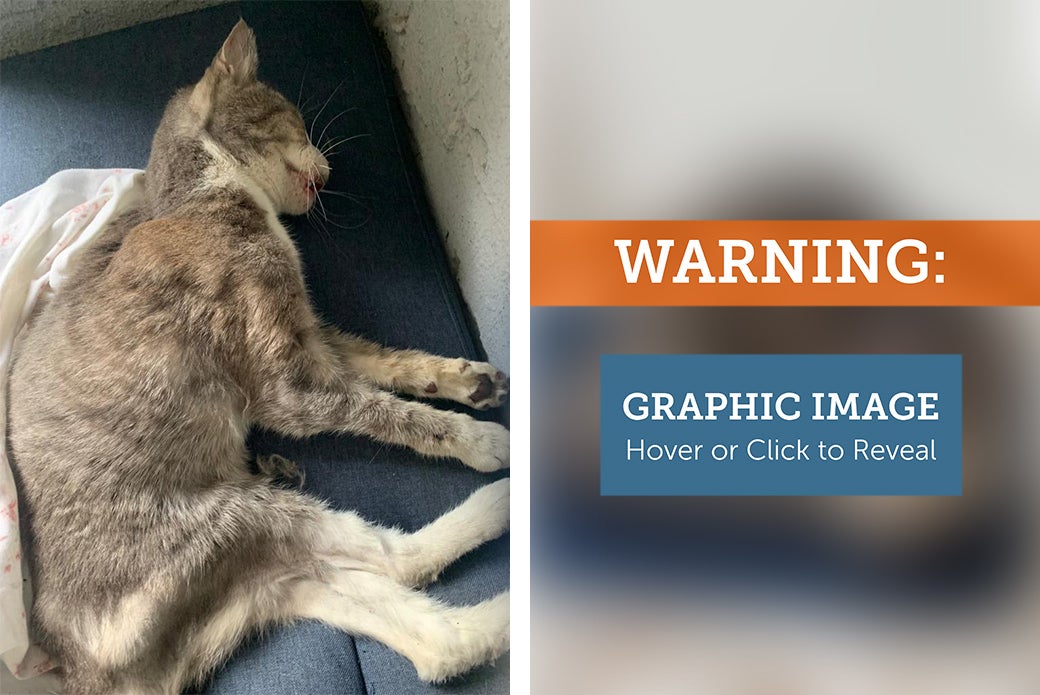
Theodore’s Resilient Transformation

On a 35-degree day last October in Queens, Zetty S. was walking a friend home. As they neared their destination, they passed by an open trash can and made a shocking discovery.
“It looked like a dead cat, but as we got closer, we saw that he was struggling to breathe; his stomach moved up and down,” says Zetty.
Zetty immediately scooped up the emaciated cat and took him to a nearby veterinarian. She spent nearly $300 to stabilize the cat with IV fluids and antibiotics.
Though she lives on a fixed income, Zetty has rescued and re-homed more than a hundred kittens and cats over the years. She has five indoor cats of her own and feeds several community cats in her South Jamaica neighborhood. She spays, neuters and rescues as many cats as she can, including the nine-year-old grey-and-white male she found in the trash can.
 Rocky, now Theodore, shortly after he was discovered.
Rocky, now Theodore, shortly after he was discovered.
“He had a very low body temperature, and they told us they couldn’t keep him overnight,” says Zetty. “They were doubtful they could save him.”
With a heavy heart, Zetty carried the ailing feline home. She applied warm blankets and Ziploc bags filled with hot water to help raise his body temperature. She was skeptical he would make it through the night.
“But the next day, he was still alive,” says Zetty, who then called the ASPCA Animal Hospital (AAH) in Manhattan.
‘In Bad Shape’
AAH veterinarian Dr. Marina Relman examined the cat, whom Zetty had named Rocky, “because he was strong as a rock and I wanted so badly for him to live,” Zetty says.
“Rocky was in bad shape, critical condition,” says Dr. Relman. “He had abrasions on his head and nose, bad oral lesions, fractured teeth and inflammation from a virus that caused him a lot of pain and made it difficult for him to eat. He also had an ear infection and was dehydrated and dirty. He wasn’t showing personality because he was really, really sick.”
 Rocky at the ASPCA Animal Hospital.
Rocky at the ASPCA Animal Hospital.
Dr. Relman focused on re-hydration and pain control for Rocky, who improved overnight.
“Despite congestion from a bad upper respiratory infection, he began to turn around,” she says. “He looked like a completely different cat.”
Dr. Relman doubts that Rocky was strong enough to jump into a trash can on his own. The ASPCA reported the case to the NYPD. Despite an investigation, no arrest has yet been made.
In the weeks that followed, Rocky was diagnosed with hyperthyroidism, which was controlled with medication. He also had chronic kidney disease and high blood pressure, both monitored regularly, and he was placed on a special diet.
Theodore’s Transformation
In March 2023, Rocky was strong enough to be placed into foster care with Jaclyn LaRosa, an Administrative Assistant at the AAH.
By then, his name had been changed to Theodore by the ASPCA Animal Recovery (ARC) team, which cared for Theo for several months.

“We chose Theodore because it was stately and mature, just like him,” says Genevieve Bartow-Popovitz, an Integrated Care Assistant on the ARC team. “I remember his constant purring and head butts. He has a presence about him and has been so resilient. I called him a rock star, too, for all he had overcome. He’s a great cat.”
Genevieve spent her free time and breaks with Theo when he lived in the offices of other staff members.
“Along with great cuddles, he likes to play and was a joy to care for,” she says. “Despite his age and some complications, he is still a vibrant, sweet boy.”

“He loved and needed human contact,” says Dr. Maren Krafchik, Director of Medical Operations at AAH. In May, Dr. Krafchik performed Theo’s dental surgery, extracting 14 teeth and removing two masses that were non-cancerous.
“He only wanted to be in your lap, purring and drooling,” she adds. “When he was alone, he would yell for attention.”
Building a Bond
Jaclyn, who often fosters cats for the ASPCA, knew that Theodore would be challenging to place considering his multiple and costly medical conditions. She contacted the ARC team—where she worked prior to joining the hospital staff—and volunteered to foster him.
Along with his kidney disease—for which Jaclyn administers a twice-daily dosage of medication—Theodore was found to have an irregular heartbeat. Jaclyn treats that condition with pills she hides in Theo’s treats once a day.
“Over time his condition can get worse, and I understand that,” says Jaclyn. “Right now, though, he’s fine and he’s happy. He can live a good life. He’s social and likes cuddling and is very sweet.”

Jaclyn adds that Theodore is observant and opinionated, and he meows when he knows he’s going to be fed. He’s curious about Jaclyn’s roommate’s cat, Maeve, though the two keep to themselves.
After five months of fostering Theo, Jaclyn realized they had formed an unbreakable bond and adopted him in July.

No one is happier about Theo’s good fortune than Zetty, who continues to care for abused and neglected cats and is grateful for the ASPCA’s help.
“After all he suffered, I'm so glad he’s doing well in his new home,” she says. “I’m grateful our efforts turned into a happy ending.”
